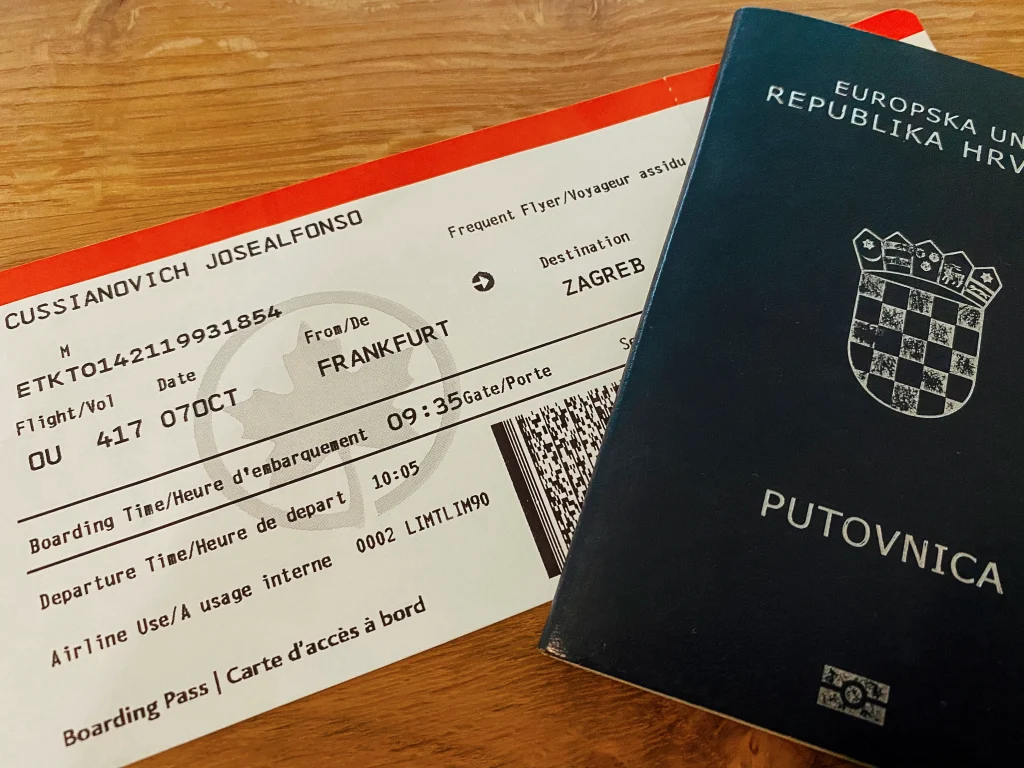On a day like today, but two years ago, I landed in Zagreb without knowing that Croatia would be the country where I would stay to live, leaving behind twenty-four years of invaluable experiences, moments, lessons, and friendships made in my country, Peru. Now I am 26 and living in Podstrana, 20 minutes south of Split. It has been two years of ups and downs, marked mainly by a current pandemic. I’ve learned a new language, lived in three cities, made new friends, met valuable people, found a job, been close to my family, and much more.
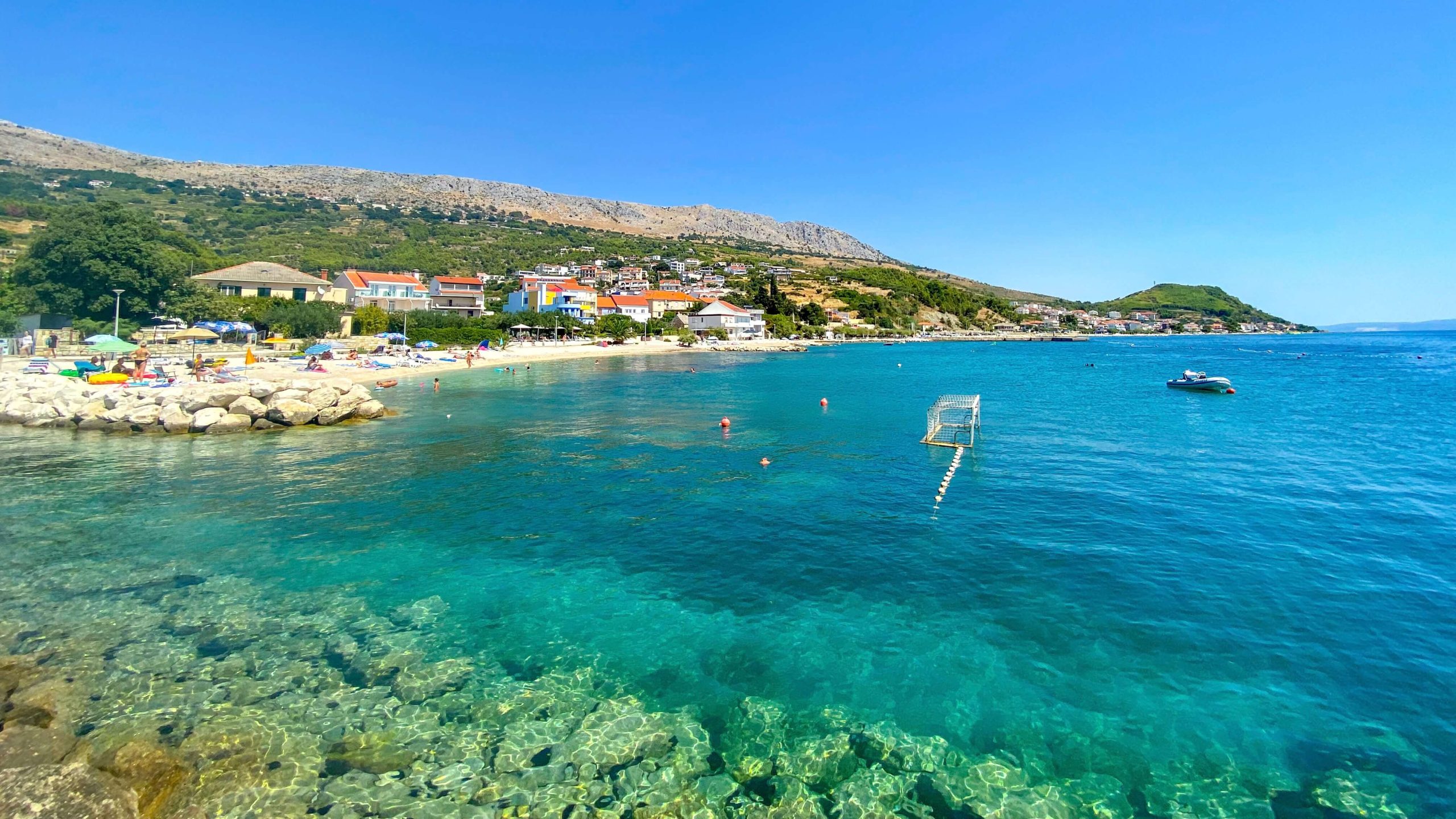
Podstrana, 20 minutes south of Split, where I currently live with my family. (Photo: Jose Alfonso Cussianovich)
Leaving your country is always a difficult decision. There are several reasons that can push one to do so, but emigrating means leaving behind important parts of your life such as your family, friends, customs, places, food, traditions, etc. And all these things have a very important meaning for those who emigrate from South America. I know of many people who made the decision to try their luck here in Croatia, whether it was to enjoy its natural beauty or to reconnect with their Croatian ancestry, and for many reasons, it didn’t work out in the end. I don’t mean to say this as a letdown, but it is true that for many it might be a bit hard to adjust their lives here.
Sometimes we do not find that compatibility between the place where we come from and the place where we have just arrived. But for whatever reason, it occurs to me that for all of us who come from South America, there are still many reasons why we could feel inspired to at least give it a try. And it is worth mentioning that I have met people from Argentina, Bolivia, Chile, and Colombia, and I think many could agree with me. And even if you don’t plan to stay longer, you will surely find your days in Croatia very pleasant and enjoyable.
There will always be thousands of reasons not to do something, but after living two years in Croatia, here are ten reasons why I think it is an ideal and easy to adapt country for all those who come from South America:
1. Country life and city life go hand in hand
As much as I wanted to, I have not been able to travel to all the countries of the world. However, one thing I have noticed in those I have been to is that city and country life are separated in many ways. I have seen that the urban lifestyle and modernity are very present in many European cities. But to find the simplicity of the countryside (if any), you have to drive an hour or even more to the outskirts of these cosmopolitan cities.
Although the phenomenon of Westernization has been transforming the capitals of South American countries progressively in the last century, the presence of the countryside will always be felt, and this is evident every day in the markets or even on the streets. Personally, I believe that my city, Lima, wasn’t any different from Zagreb, Rijeka, or Split in that sense.
Pazar, the market outside Diocletian’s Palace to buy local products in Split. (Photo: Jose Alfonso Cussianovich)
I have noticed in Croatia that although in Zagreb, Split or Rijeka one can really feel like in a European city, rural life is not something distant for its inhabitants. It really doesn’t matter whether you work as a business person in the financial district, or if you work in the field outside of the city. Chances are that both people will cross their paths anywhere they go and none will look the other over their shoulders.
2. Politics and public sector
Not necessarily a good reason, but it definitely builds our tolerance for a change of scenery. When I began to meet other Croats, they questioned me (amicably) for leaving a corrupt country to arrive in another one. I did not want to expand on the subject, and justly demonstrate that the political or social situation in South America is totally different. I come from a country with as much or even more bureaucracy, but I think that precisely that has helped me to be tolerant and very patient when going to the MUP or the HZZO for any paperwork.
Of course, if you come from a country like Singapore, Lithuania, Finland, or New Zealand, having to go to any tax administration office here would be the closest thing to a horror story. But for us, South Americans, coping with long queues, grumpy employees, half-baked information, or being told to come back next week, is an everyday thing. My advice? Take a deep breath before entering the building of a public institution, and be friendly with everyone you interact with inside. You will see that it is easier for them to streamline processes with people who treat them with cordiality.
As for the political situation, well, it is not my intention to trivialize what is happening here. I am aware that Croatia is not a country free from political tensions or corruption. After all, and despite the great development that has been taking place after the war, it is still a young country with a lot of room for improvement.
However, and that is why I say that it is not my intention to trivialize what is happening in Croatia, what is happening in South America is serious. The Croatian diaspora is found mainly in countries such as Argentina, Bolivia, Peru, Chile, Venezuela, or Colombia. In recent years, the social, political, and economic situation in these countries has reached critical moments: coups, police repression, disappearances, famines, mass migration, inflation, and more, unfortunately.
It is true that the idea of arriving in a country as safe and beautiful as Croatia is more than enough reason to buy tickets, pack our things, and try our luck there. But it is important to recognize that, in many cases, motivation may revolve more around the concept of survival. To travel so far and leave everything behind, maybe it can mean that no matter what happens elsewhere, it can’t be worse than where you came from.
And this goes both for young people who seek to grow professionally in a better environment and for those who have already spent enough years of instability in their countries and are looking for some peace to retire.
3. Gastronomy
This has to be one of the most important points, and one that I have been analyzing more over time. Food is VERY important when it comes to changing countries. And there are so many experiences: what you find in the market, the homemade recipes, what you see on the menu of a restaurant, what you find open at midnight, what they serve you at your partner’s house, the typical food in a town, etc.

The pašticada is, without a doubt, one of my favorite dishes. (Photo: Nina Djurdjevic/PIXSELL)
In this sense, I think there is an interesting link between item one on this list and the one you are reading right now. Somehow, I know that there is food that can be considered a luxury, and I know of luxuries that will always be within your reach. In Peru, for example, food is a luxury. And not because of the price, but because of the quality. And the best of all is that you can find these luxuries on your table and at almost zero cost. And I believe something similar happens in Croatia. The best Croatian food can be found when you are invited to eat at your friend’s house or in inexpensive restaurants.
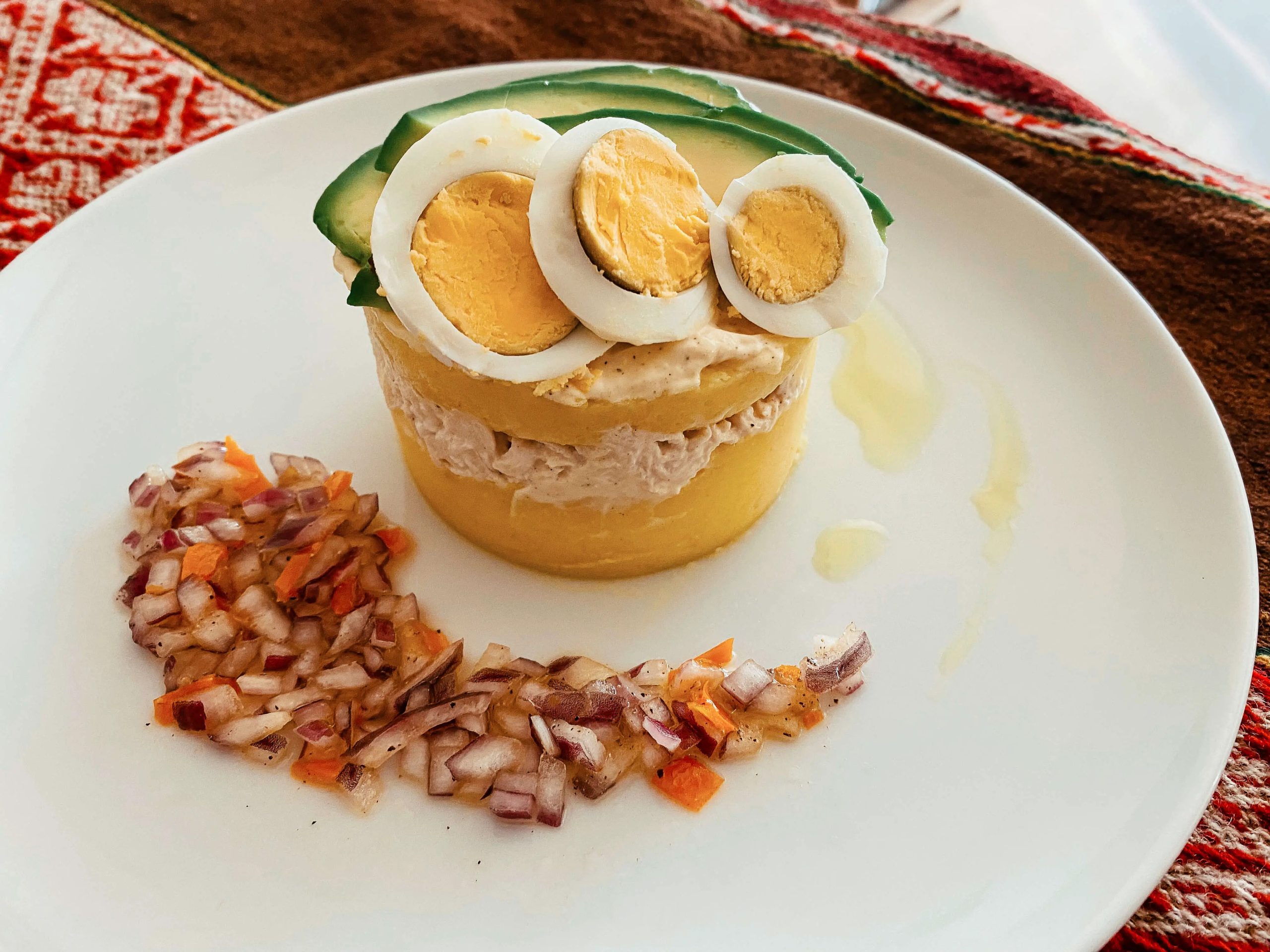
The ”causa rellena”, one of the emblematic dishes of Peruvian gastronomy. Never in my life would I have imagined eating it in Croatia. Prepared by my father at home, with a mixture of ingredients bought here in Split (potatoes and lemons), as well as others from Peru that were bought online (yellow pepper). Nothing is impossible! (Photo: Jose Alfonso Cussianovich)
It is important that a country that boasts culinary diversity and typical gastronomy is accessible to all. I like living in a country where dishes have stories and family recipes go back to very ancient times. When I arrived in Croatia I asked myself, what now? What will I eat? Not only have I found a country that has very good ingredients in its markets to try to prepare dishes from my own country, but that the food here is so good that it will easily take away your nostalgia.
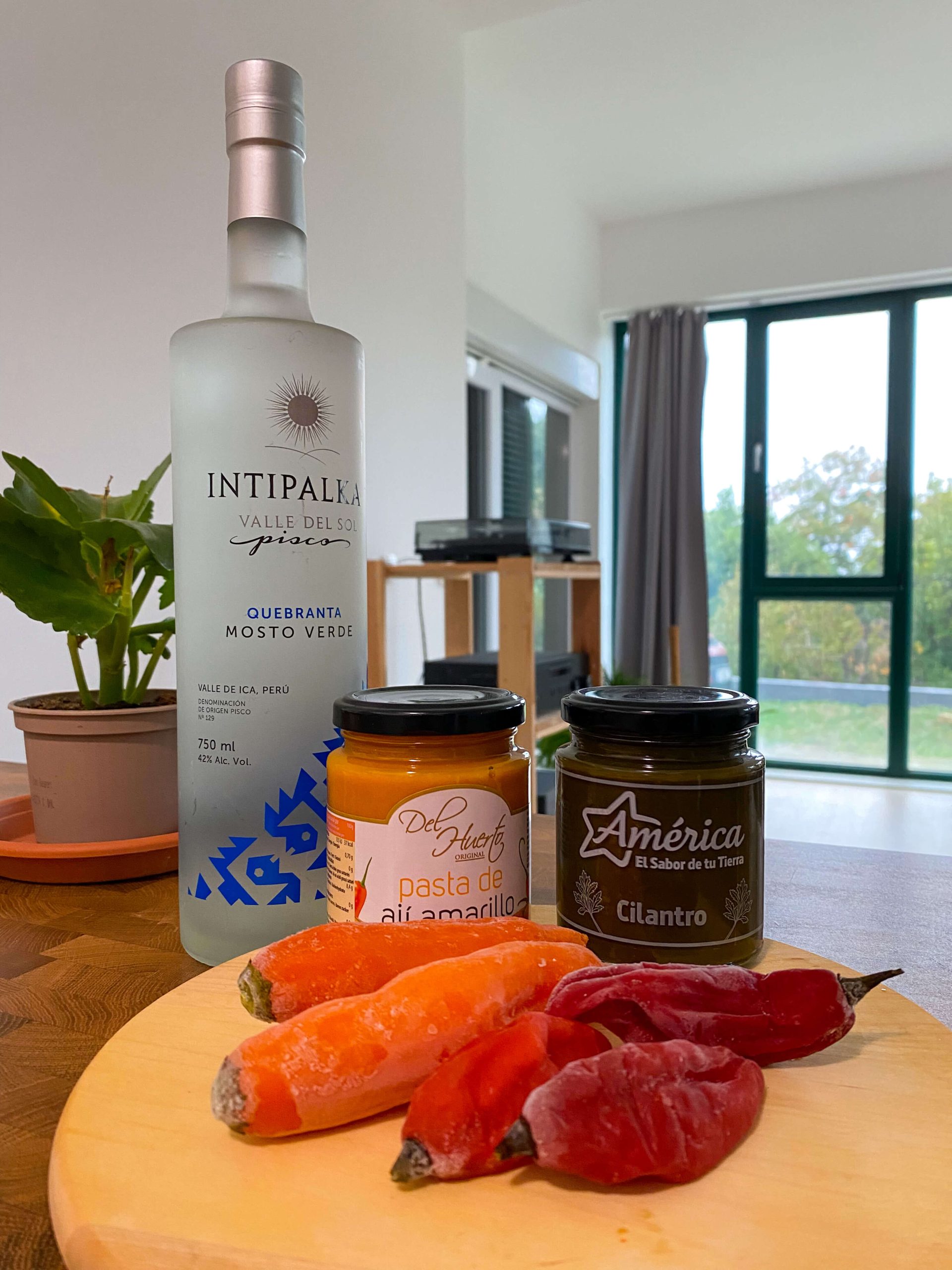
Out beloved Pisco, yellow pepper, limo pepper, cilantro… just some of the products that help the Peruvian palate not to be homesick. (Photo: Jose Alfonso Cussianovich)
And do not worry, if we have learned something here, it is that you can order many culinary products from Latin America online, and they arrive at your home in a few days and at a great price. In addition, there will always be the possibility that you convince your family and friends to visit you and bring you something typical of your country, such as liquors or sweets for your nostalgic palate.
4. Folklore and Traditions
Among the things where I find the most similarities between the cultures in the countries of South America with Croatia, I believe that the affection and respect for the ancient traditions, customs, and folklore of our peoples and countries is something that we undoubtedly share.
From a very young age, they taught us at home and in schools about typical dances, costumes, celebrations, dishes, music and on what dates they were especially important. There are even national folklore competitions, and I’ve always been pleased to know that people of all ages participate in them. This paragraph may well have been written as the testimony of a Croatian by birth as well as a South American.
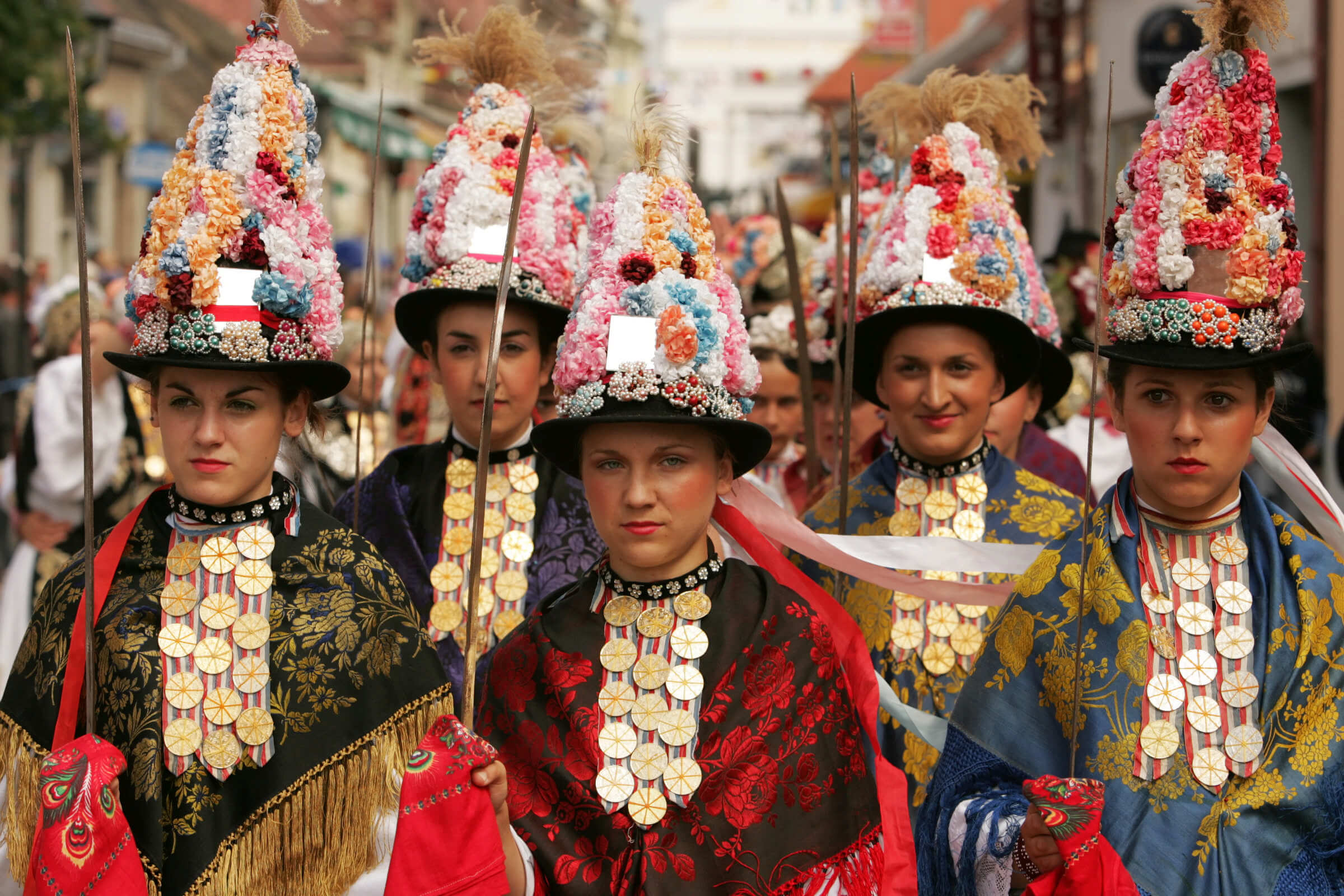
Slavonian girls and their typical costumes. (Photo: Mario Romulić)
I encourage you to drive or travel through Croatian territory, be it in Dalmatia, Istria, or Slavonia, to any small town and you will find a population with a lot of roots and whose identity is reflected in a large and diverse number of customs and distinctive elements.
Unlike other European countries, I have noticed that the presence of local customs and traditions is in basically all regions of the country. If you were born in the capital and surrounded by buildings and modernity, it is still very difficult that you might not have some kind of connection with this folklore, and that is something that happens in both Lima and Zagreb.
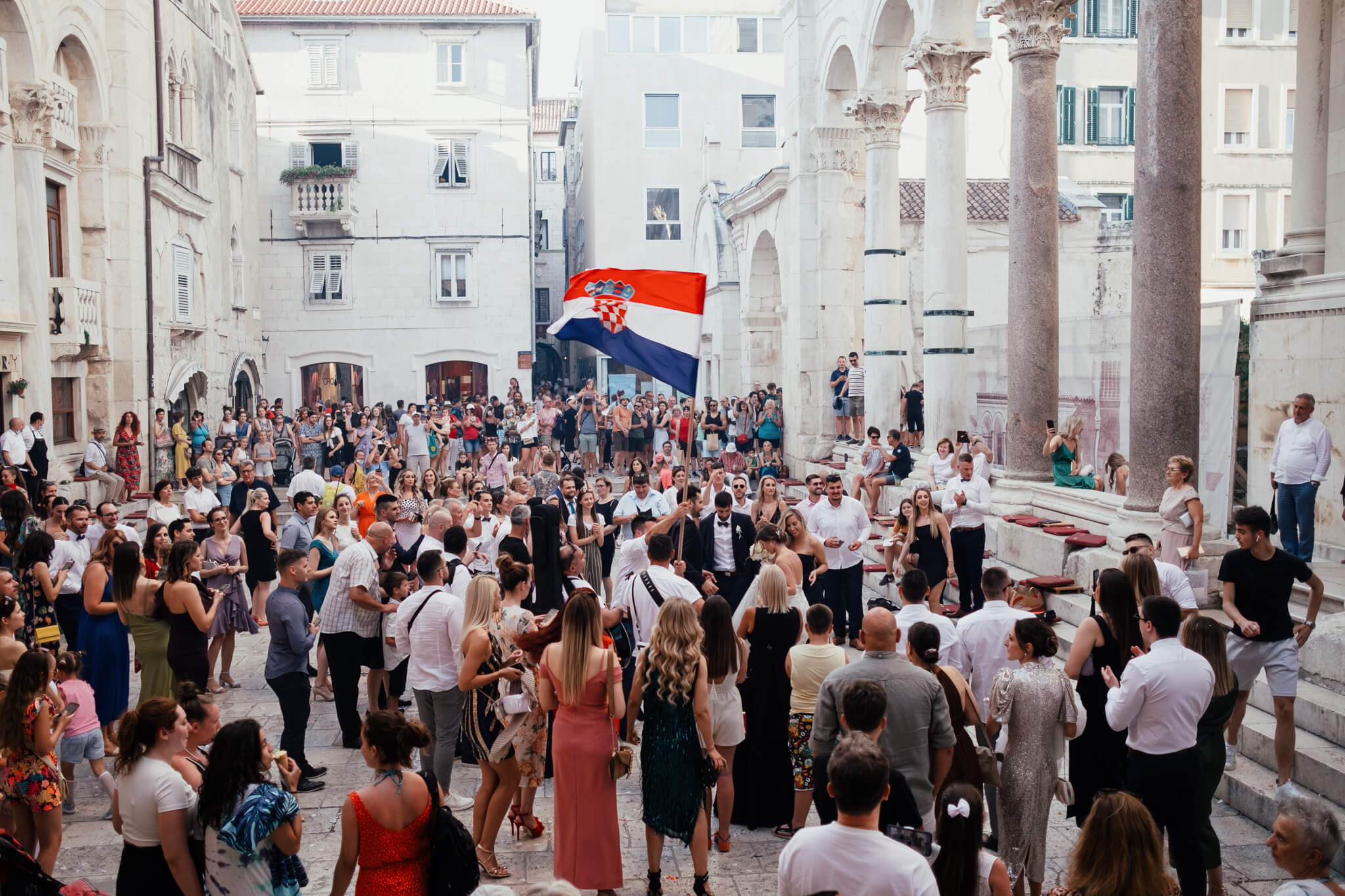
Celebration of a wedding at Diocletian’s Palace, in Split. (Photo: Jose Alfonso Cussianovich)
On the other hand, being South America a continent with a very strong Catholic identity, you will find a country that boasts beautiful cathedrals, churches everywhere, impressive religious festivals, an internationally recognized devotion, and even an official miracle!
5. Weather
I can’t imagine myself living in a country or city with hellish temperatures during the summer or some freezing temperatures during the winter. Yes, it is VERY hot on the Croatian coast between June and August, and I can confirm this after an almost unbearable heatwave during the summer. But it is definitely manageable. Why? Well… BEACHES!
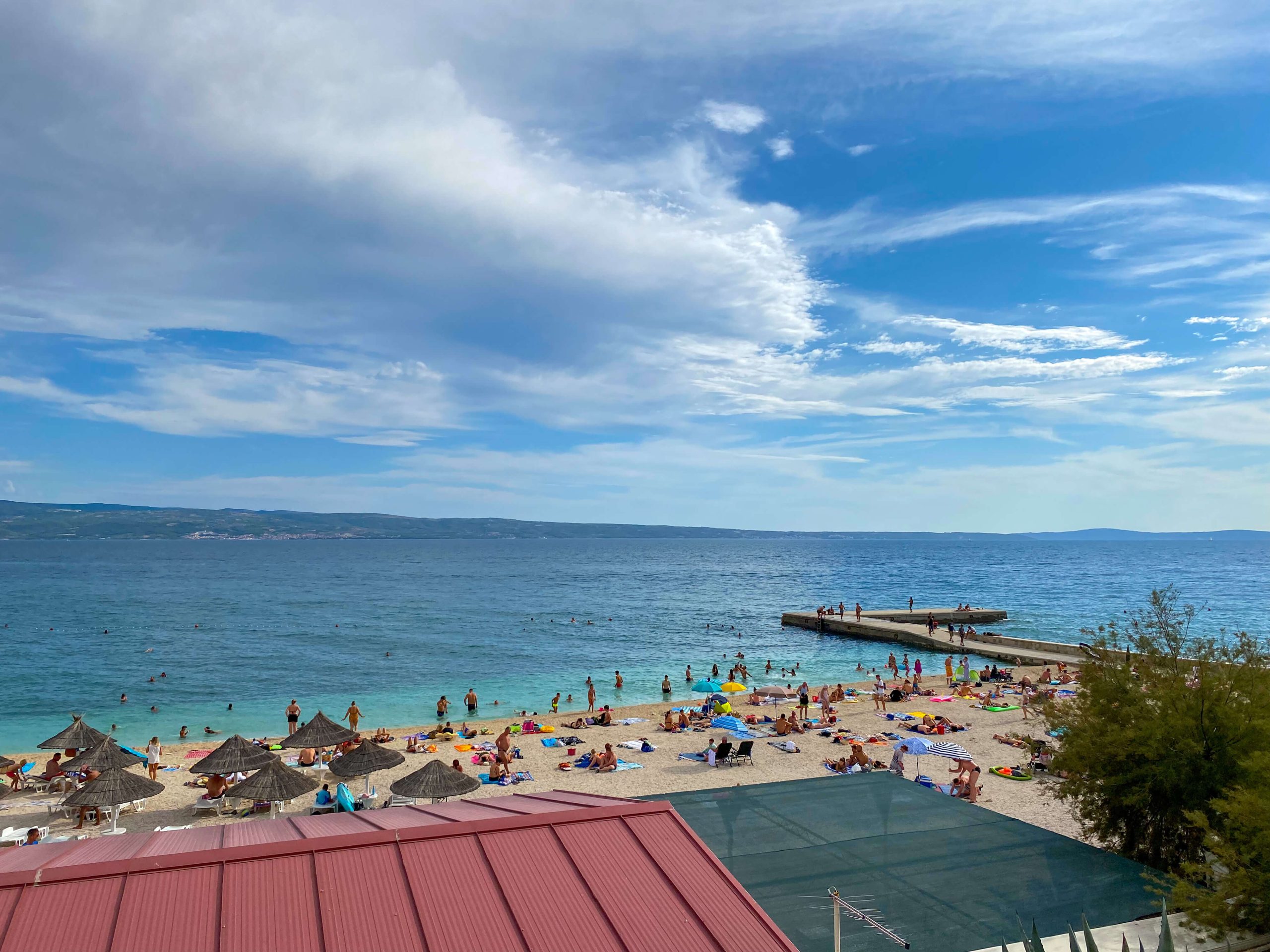
A beach just 5 minutes from my house, in Sv. Martin, Podstrana (Photo: Jose Alfonso Cussianovich)
Many countries in the world can boast of having beaches to which their inhabitants can flee when the temperature rises, but definitely, both in South America and in Croatia, it is not so much a solution but rather a lifestyle. And if it is not the sea, it may well be a visit to a lake or river. In any case, those of us who come from the southern hemisphere know how to counteract the heat, whether on the coast or in the jungle.
I cannot deny, however, that in my two years living in Croatia I have not been somewhat intimidated by the cold. Although it is nothing compared to the situation in Scandinavian countries, Russia, the United States, or others, you should never forget a good coat and gloves. It may be that those from Argentina, Chile, Bolivia, or the Peruvian highlands feel somewhat more familiar with subzero temperatures, but those who in some of their worst winters registered 17 degrees (like me), we will surely find in the heating systems and thick sheets a few friends.
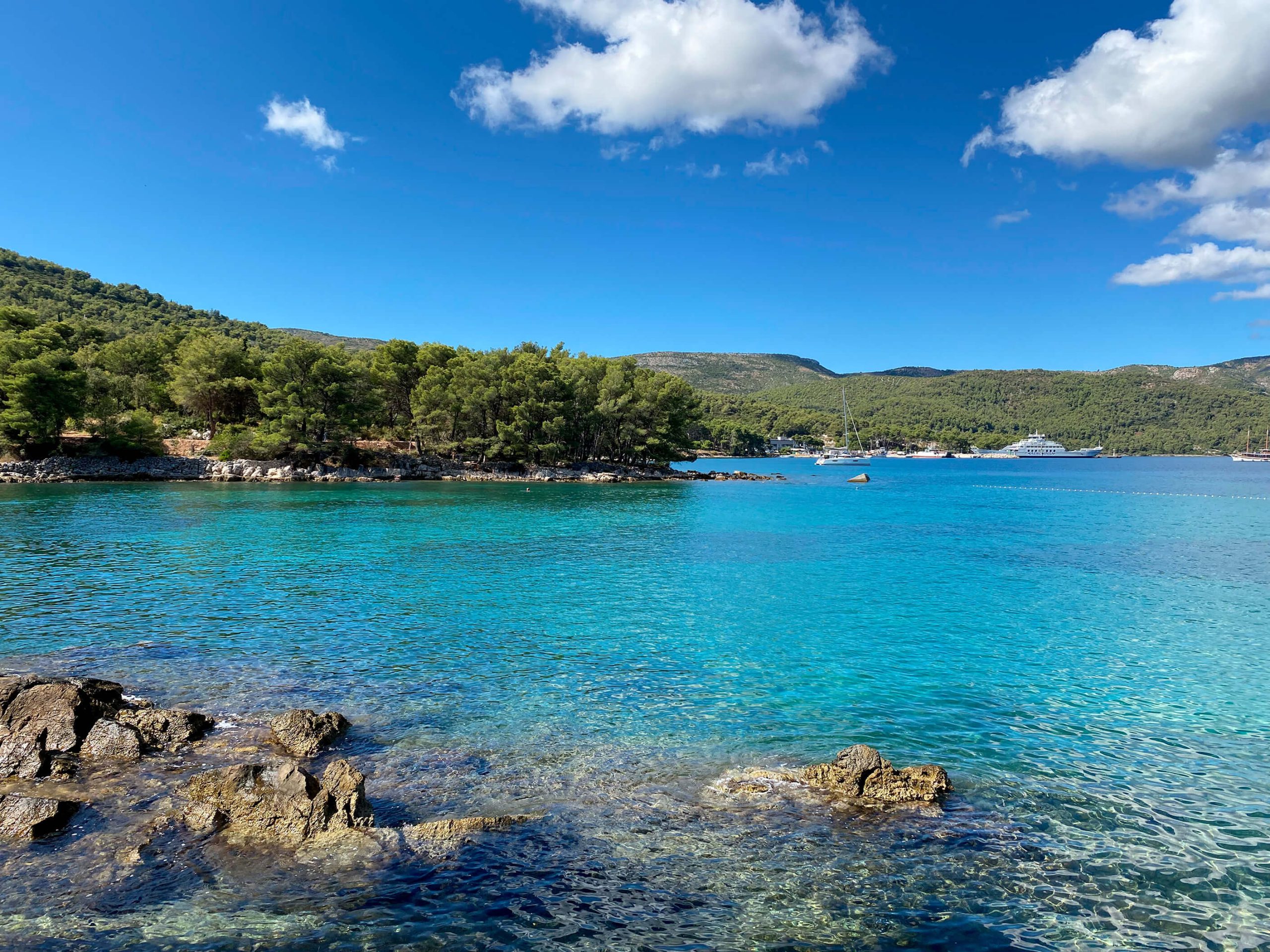
Arguably my favorite place in Croatia, the town of Stari Grad on the Island of Hvar. This is Lanterna Beach, between the town and the ferry port. (Photo: Jose Alfonso Cussianovich)
If I’m sure of one thing, it is that Croatia is a country where we can have a good time 365 days a year, and not only because it can withstand high or low temperatures, but because each season offers a huge variety of activities and events. Argentines and Chileans, for example, will find it very pleasant to be able to ski and snowboard in Sljeme (Zagreb) or Platak (Primorje-Gorski Kotar) during winter.
6. Sports
Despite the enormous fanaticism I have for football, and knowing how spectacular the experience was during the 2018 World Cup in Russia, I must admit that Croatia is much more than football. Water polo, wrestling, athletics, handball, basketball, tennis, judo, tae kwon do, rowing, sailing… is there anything they can’t do? Croatia has returned from Tokyo 2020 with 8 Olympic medals, and even with tennis doubles final where the gold and silver medals were contested only between Croats.
I see Croats rowing on Lake Jarun in Zagreb, practicing water polo on the beaches of Omiš, or sailing in the waters of Split, and many practices it from a very young age. It is clear to me that sport in Croatia is already part of the local culture. And the best of all is that the sport is not only for those who practice it but also for those who are in the stands. The fervor of the Croatian spectators is second to none. Whatever sport it is, in any competition, Croats live it to the fullest. It happens that in many countries, one or two sports are the favorites and the rest are only for a niche audience. However, here in Croatia, it is a responsibility to support all your athletes in any discipline. The best part is seeing the streets and squares lined with red and white checkered T-shirts and flags, thunderous chants everywhere, and plenty of beer. No matter the outcome, sporting events in Croatia are always a reason for parties and celebrations.

Supporters of the national team in the latest edition of the EURO tournament gathered in Ban Jelačić square, Zagreb. (Photo: Jose Alfonso Cussianovich)
And in addition to classic sports, Croatia is an ideal destination for all those in love with extreme and adventure sports, and I know there are many of them in South America. The geography of the countries that share the Andes mountain range allows its millions of inhabitants to enjoy numerous sports such as hiking, mountaineering, skiing, snowboarding, cycling, among others. If you are one of those who lives and breathes adventure, Croatia has a lot to offer you.
7. The Diaspora and Croatian identity
As many must know, there is a large Croatian diaspora in South America, mainly due to migratory movements during the second half of the 19th century, and the first half of the 20th century. The countries with the highest number of Croatian descendants are by far Argentina and Chile. However, there are also a significant number of Croats in Peru, Venezuela, Bolivia, and Colombia. It is true that over time large groups of migrants have arrived from various origins, such as Italy, for example. However, I feel that there is something different with Croatian migrants.
There is no easy migration story. The simple fact of leaving your country, without a clear destination, is difficult to digest. As I read somewhere, no one leaves their country unless they feel threatened in theirs. However, who am I to judge someone’s reasons? It could be said that nowadays it is easier to leave the country for the simple fact of changing the scenery and experiencing what the rest of the world can offer us. But in the last 10 years, there are reasons in many nations to believe that there is no prospect of life on their own soil. It is neither more nor less than the turbulent reality of millions of Croatians who, more or less 100 years ago, decided to leave their properties and lands in a country as beautiful as theirs, for a totally unknown place.
And that’s what intrigues me the most. Because somehow, some came to start from the bottom, and others came with small fortunes. And for all that time, to this day, they knew they had something in common after all: they had left the land where they grew up. So they stuck together, and that’s how Croatian communities were formed in South American countries. Today, there is a huge Croatian community on the South American continent, in which members share their experiences and those of their ancestors, or help each other navigate through time and trace their origins.
In 2018, my father (on the right) was able to meet Dusko Kusijanović, our distant relative from Mokošica, in Dubrovnik. In the picture, they’re both looking at the house where our ancestors grew up. (Photo: Patricia Medina, my mom)
My own experience returning to my ancestor’s country has taught me that Croats greatly value transferring their pride in their country and its traditions to their descendants, and that is why so many young people born in the 21st century remain curious to venture out. in the country of their distant relatives.
I insist, I still have a lot to learn from the Croatian diaspora in South America, but I feel that although the migration took place to all corners of the planet such as the United States or Australia, the chaotic political and social events that have taken place in South America over the past century has motivated countless Croatian descendants to consider returning to their motherland. That is why, if today you seriously evaluate trying your luck in Croatia, it has a large community of Croatian-South Americans who are already making their living in Istria, Rijeka, Zagreb, Zadar, Osijek, Split, Dubrovnik, etc. They will not hesitate to give you a hand from the first day you land in Croatia, as did the Croats who arrived in Argentina, Chile, Peru, Venezuela, Bolivia, or Colombia a little more and less than a century ago.
8. Nationalism
Some will say that being a nationalist, especially in today’s conjuncture, is nothing to celebrate or be proud of. Certainly, taking our nationalism to the extreme gets us nowhere but conflict. But keeping it present as part of our identity is not harmful, as long as we show the same respect for others’ identity.
There are many ways to express love towards our country. Appreciating our traditions, supporting sports teams, celebrating our gastronomy, singing our anthem at the top of our lungs, remembering our history… you name it.
The vast majority of countries extend this sentiment to their inhabitants from the time they are children, both at home and in schools. Although I have not spent enough time in other countries to analyze in-depth the type of nationalism they carry, I know that in almost all of them there are plenty of reasons to be proud of their roots and their land.
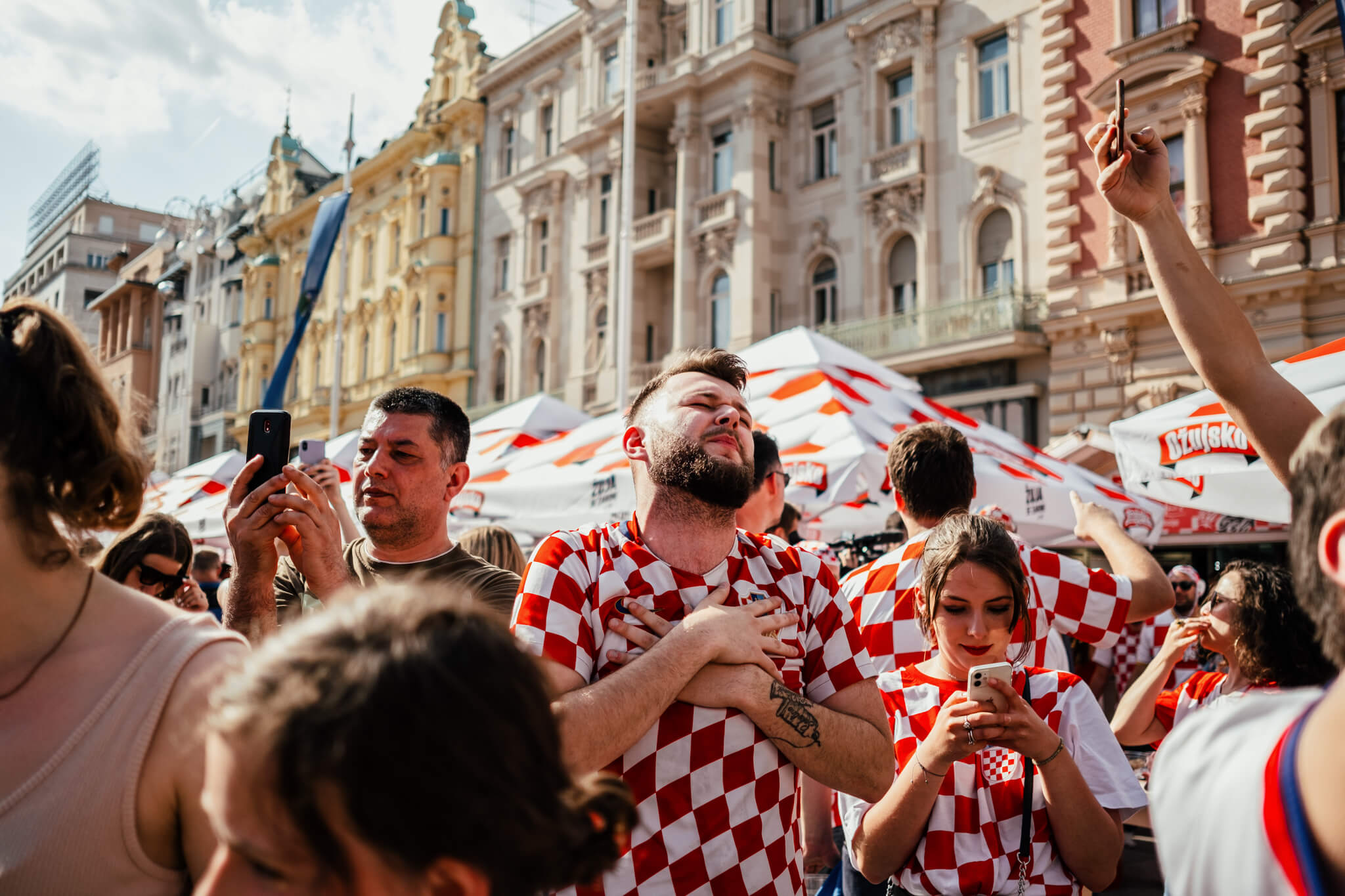
(Photo: Jose Alfonso Cussianovich)
I understand that while Croatia is a European country, and for many, it is considered a first-world or western country, its recent history proves to be problematic, hard, and of late development. Many nations can boast of retaining the same name or basically the same territory of several centuries ago, and whose governments consisted of transitions between monarchs or political parties. However, in the particular case of the South American countries and Croatia, achieving independence through wars was, unfortunately, the common outcome.
We will always come across people who will use their country and their pride to minimize the rest. There is no exception. However, I have the pleasure of living now in a country where I hear its inhabitants speak with as much pride about their country and its history as I would, as well as their eloquence when it comes to being critical of themselves when the situation requires it.
9. Latin culture in Croatia
This was definitely a surprise and a very welcomed one. Although I admit that I did not know a lot about Croatian society before arriving, never in my life would I have imagined that Croats have consumed enough of our culture, both when it comes to watching popular telenovelas or participating in salsa dancing lessons.
If you don’t believe me, just tell a Croat that you come from a South American country and they will immediately tell you that they grew up watching the popular melodramatic series that were exported from our continent, and they will even dare to impress you with some phrases or words they learned in Spanish.
It has been a very positive experience to meet many Croats willing to learn more about my country and that of other colleagues of mine from South American countries. And I think that is why it is good to refer to the previous point, about nationalism, because you can put your country at the top, but it does not mean losing interest and respect for the rest of the world. I know, for example, the importance of rakija in Croatia, but with great pleasure, I have met Croatians who have tried the national drink of Peru: pisco. Rest assured that when you come to Croatia you will be welcomed with open arms.
10. Opportunities
I remember very well that in the weeks leading up to my trip to Croatia I always tried to clarify that it was not a whim or a luxury. For some, moving to Europe may just be a matter of changing their lifestyle, but the decision I made was extended to my entire family due to the fact that it was no longer financially viable to continue living in my country. The mission was clear: arrive and work hard.
Now, if it comes to work and study opportunities, many South Americans would opt for other destinations before Croatia, such as Spain, the United States, Portugal, Italy, Canada, or the Netherlands, to name a few. In a way, they are countries whose economic development goes hand in hand with a more established and long-lived system of work and opportunities.
But the interesting thing about Croatia is that it is a country that, although it has barely 30 years of independence (26 if the end of the war is considered as a peaceful beginning for its own development), has grown very quickly compared to the rest of the countries in the Balkans. And the growth continues each day. In just two years in Croatia, I have noticed that although there is great room for improvement in many aspects and sectors, it can be said that in other industries it can be a leader, such as tourism.
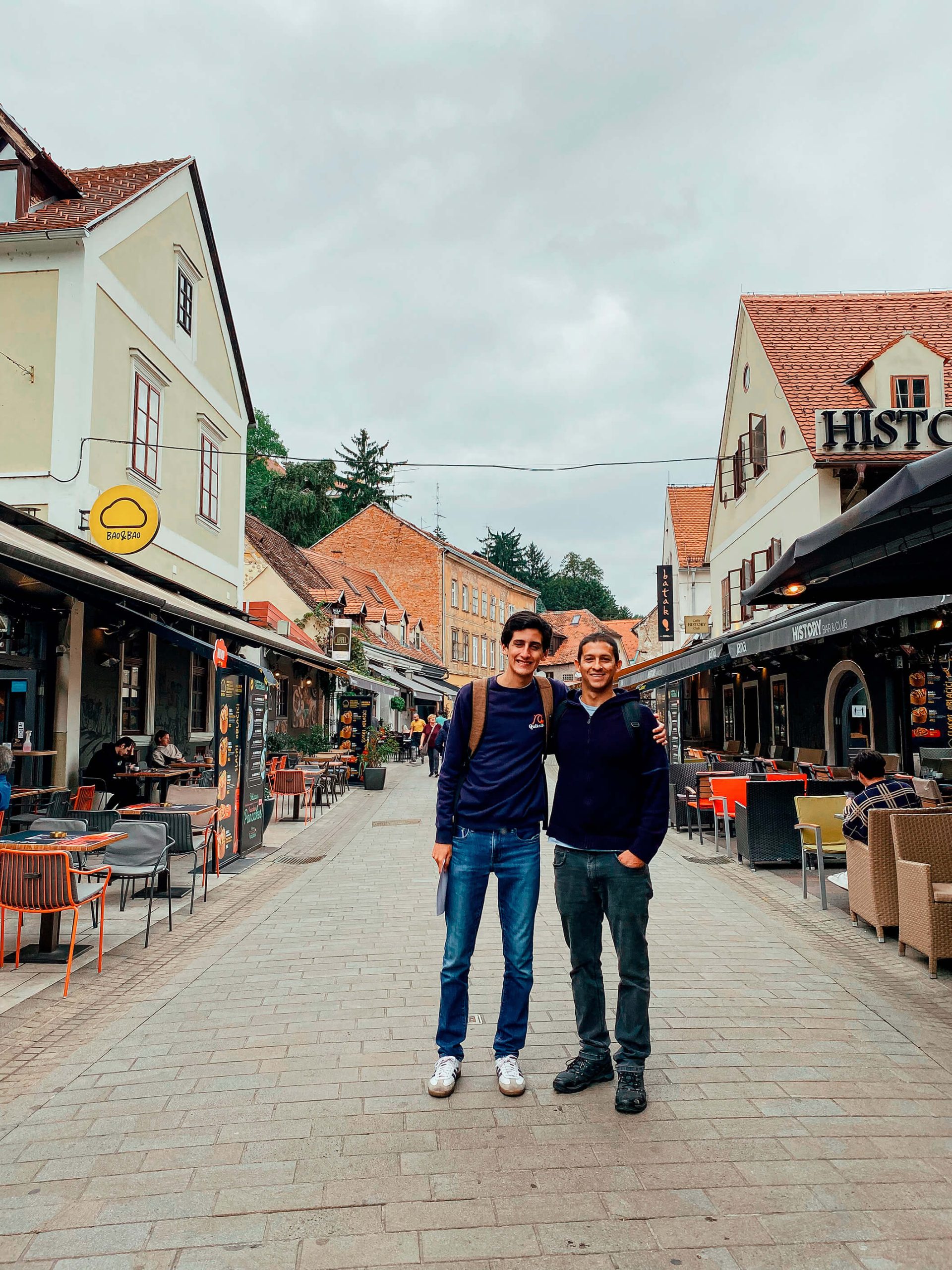
Two of my cousins: Julian Cussianovich (18) on the left, and José Salvador Palacios (39). Different generations, but they’re both now in Zagreb, in a new chapter of their lives. (Photo: Jose Alfonso Cussianovich)
For young South Americans like me, who mostly have grown up with the very clear goal of working hard to get what they want, choosing Croatia as the next destination is definitely an attractive proposition. Not only will they arrive in a country where many universities and companies do very well with English, but where they will also find better working and living conditions, mainly due to the accessible health and safety system on the streets.
The best of all? There are many doors to open. It is a great opportunity for those who come to find their distant relatives, those who wish to study the Croatian language and culture through the program offered by the Central State Office for Croats outside the Republic of Croatia, those who wish to invest in land, property or in the tourist business, digital nomads who can now apply for a permit to work remotely in any city in Croatia… the opportunities are there, you just have to dare!
For more about the Croatian Diaspora, visit our dedicated page here.

